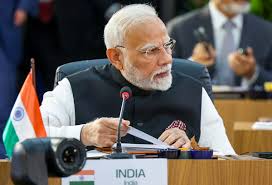PM Modi’s 4 key suggestions to enhance cooperation among BRICS nations

As global tensions rise and economies shift, Prime Minister Narendra Modi urged the BRICS nations—Brazil, Russia, India, China, and South Africa—to strengthen their collaboration. At the recent BRICS Summit, he shared four focused proposals. Each one aims to make the bloc more influential, inclusive, and effective in solving global challenges.
Let’s explore the four suggestions and how they could shape the future of BRICS.
1. Reform Global Institutions and Uphold Multilateralism
Modi called for urgent reforms in global institutions such as the United Nations, IMF, and World Bank. These bodies, he said, no longer reflect current geopolitical realities. Most of them were formed decades ago and still favor developed nations.
He encouraged BRICS to speak in one voice. A collective effort, he noted, could push for a fairer and more democratic international order. India believes that emerging economies and the Global South must play a bigger role in global decision-making.
“Institutions must evolve to match today’s world,” Modi said, urging for a stronger BRICS presence on the world stage.
2. Focus on Inclusive and Sustainable Development
The second suggestion highlighted the need for growth that benefits all. Modi emphasized the importance of shared learning, tech collaboration, and financial partnerships. These steps, he said, are key to achieving the Sustainable Development Goals (SDGs).
He spoke about issues such as clean energy, water management, and sustainable farming. These problems affect all BRICS nations, and joint efforts can lead to faster progress. Modi mentioned India’s work in climate leadership, especially through initiatives like the International Solar Alliance.
“Development must include everyone,” he said. The focus should be on lifting people out of poverty, closing the inequality gap, and building climate-resilient economies.
3. Build Strong Digital and Tech Partnerships
In today’s world, digital growth shapes economies. Modi’s third point stressed the need for deeper BRICS cooperation in areas like digital infrastructure, cybersecurity, and financial technology.
He highlighted India’s success with platforms such as Digital India, Aadhaar, and UPI. These systems have made services accessible to millions. Modi offered to share India’s digital models with BRICS partners to help them boost inclusion and innovation.
He also pointed out the importance of regulating new technologies. Ethical AI development, cross-border data rules, and shared digital standards should be on the BRICS agenda. To begin this process, Modi suggested the creation of a BRICS Digital Task Force.
4. Strengthen People-to-People and Cultural Exchange
Modi’s final proposal focused on human connections. He stressed that BRICS is not just about leaders and governments. It should also be about people, cultures, and shared experiences.
He proposed more student exchange programs, joint research projects, and cultural festivals. These activities can create long-term bonds and build trust between nations. They also help younger generations understand and appreciate each other’s diversity.
“Let’s bring our people closer,” Modi urged. Building mutual respect among citizens, not just leaders, will make BRICS stronger in the long run.
Conclusion: A Blueprint for a Stronger BRICS
Modi’s four-point vision outlines a modern path for BRICS. He wants the group to champion fair governance, inclusive growth, tech collaboration, and cultural exchange. These ideas reflect India’s broader global goals and its desire to lead with values.
As tensions rise worldwide, BRICS must find unity in diversity. With collective action and trust, the group can become a powerful voice for developing nations. Modi’s message was clear—BRICS must evolve from a dialogue platform into a driving force for global good.
Whether these proposals become action will depend on cooperation and political will. But one thing is certain: Modi has offered a clear vision. Now it’s up to BRICS to turn that vision into results.






